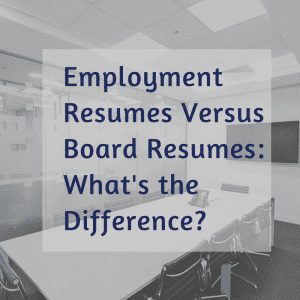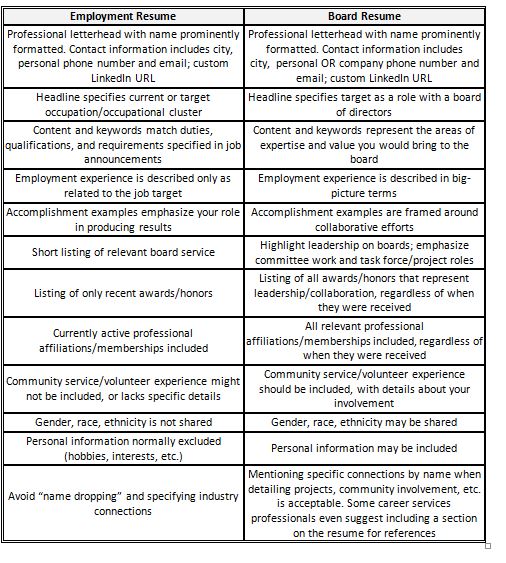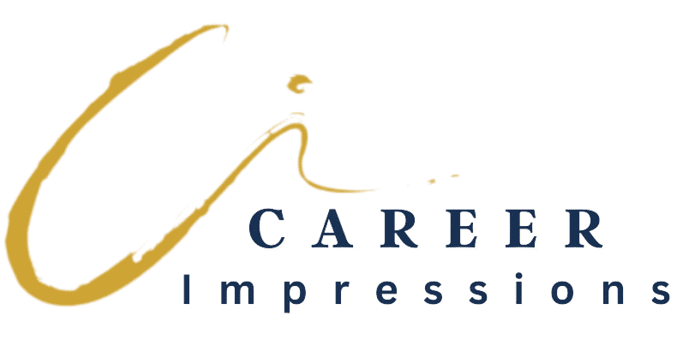
Executives: Writing a Resume for Nonprofit and Corporate Board Positions
 If you’ve been asked to submit a resume for a board position, you may be wondering if that resume differs from a standard employment resume. There are both differences and similarities between the two.
If you’ve been asked to submit a resume for a board position, you may be wondering if that resume differs from a standard employment resume. There are both differences and similarities between the two.
Much the same as writing a resume for a job search, it is important to know your audience before you begin. There are many things to consider, from the broad to the specific:
- Are you targeting a corporate or nonprofit board?
- Does the company or organization that is supported by the board fall within a specific industry?
- How are board members recruited, screened, and selected?
- What skills, expertise, and experiences are relevant to board service?
Your answers to these questions will influence the overall tone of the resume, what to include, what to exclude, what to spin differently, and what keywords to build into the content.
Corporate or Nonprofit Board?
Before examining the similarities and differences between the two types of boards, first keep in mind the overarching differences between corporations and nonprofit organizations.
- For-profit corporations are owned by stockholders; their focus is on generating money for the owners, and they measure success by profits.
- Nonprofit organizations are owned by the public; their focus is on serving the public, and they measure success by meeting the needs of the public.
Whether the board oversees a Fortune 500 company, another type of for-profit company, or a nonprofit organization, there are more similarities than differences. Every board has written articles of incorporation, bylaws, and governing principles that outline the responsibilities of the board of directors. Standard board policies cover member independence, conflict of interest, conduct/ethics code, expectations, confidentiality, and indemnification.
Taking the time to familiarize yourself with these when targeting a specific board of directors will help you formulate your resume strategy.
Planning Resume Content
Identify your areas of expertise and how they might benefit your target board. Both corporate and nonprofit boards have a need for members whose experience and expertise fall within the following areas: budgeting and finance, human resources, technology, strategic planning, risk management, succession planning, legal, compliance, marketing, public relations, and consensus building.
Experience within the same or similar industries, and insight about customer/client needs is also essential. And both types of boards value members who have access to a variety of resources (government connections, attorneys, accountants, consultants).
Corporate boards also look for global experience and expertise in matters such as mergers and acquisitions, research and development, IPOs, shareholder proposals, and investments.
A few terms that are commonly heard in corporate boardrooms — and that you’ll want to consider including as keywords in a corporate board resume— are earnings per share, EBITDA, quarterly returns, stock buyback, real estate transactions, Sarbanes-Oxley, and Dodd-Frank.On the other hand, nonprofit boards seek members whose expertise may include grant writing, fundraising campaigns, donor relations, endowments, 501(c)(3) applications, and volunteer management.
Some of the keywords that you’ll want to include in a nonprofit board resume are donor capacity, restricted/unrestricted gifts, pledges, stewardship, community education, foundations, and capital campaigns.
Keywords representing personal style that belong in both corporate and nonprofit resumes include consensus builder, collaborator, motivator, strong communicator, and diplomatic.
Although you want to draw attention to your contributions and accomplishments, avoid language that suggests you single-handedly brought about results. Whereas the content and tone of a jobseeker’s resume is geared toward promoting the candidate and, ideally, elevating his or her career, the president and CEO of BoardSource made the distinction in tone and content clear in the following statement: “When you join a board, what you are really saying is that you agree to put your personal interests and ambitions in the background. You are there to best serve the interest of the company or organization.”
Resume Sections
The overall format of your board resume is not that different than your job search resume; however, sections that are considered optional or secondary to actual work experience have more credence when positioning yourself for a board of director’s role.
- Letterhead: As with your job search resume, design your letterhead so that your name is formatted as the most prominent feature. Include all pertinent contact details.
- Headline: The headline should make it clear that you are targeting a board position and may include some key functional areas of expertise you bring to that position and the industry in which you have gained this expertise. For example:
Target: Board of Directors — Commercial Banking & Finance
Financial Analysis | Mergers & Acquisitions | Audits
- Profile: This can be a paragraph of three to five sentences. You want to highlight your knowledge of, connections in, and commitment to the industry or community in which the board is involved.
- Employment Experience: As you develop this section, think more big-picture and less detail. Unless your responsibilities and tasks are specifically relevant to the role you would perform on the board, try to keep the information very high level. Make sure you integrate relevant keywords and, when specifying accomplishments, spin them in such a way as to show they were the result of a collaborative effort.
- Optional Sections: Here is where you might feature more examples and details than on your employment resume. Create a section for board experience; include organization names, cities, states, and service dates (even if they are not relevant to the position of interest, because they still demonstrate your commitment and leadership skills). Also include sections and details for professional affiliations/memberships, recognitions/awards, community involvement/volunteer experience, and presentations. And because diversity (age, gender, race, and ethnicity) is a key consideration when selecting board members, you might include things that you would normally downplay on a job search resume.
- Education: In addition to the type of degree and field of study, include leadership roles and honors received, even if they are somewhat “dated.” Also include in this section professional credentials and certifications, as well as conferences and workshops attended.
Employment Resumes Versus Board Resumes: What’s the Difference?
Here’s a handy reference chart outlining the differences between an employment resume and a board resume:

